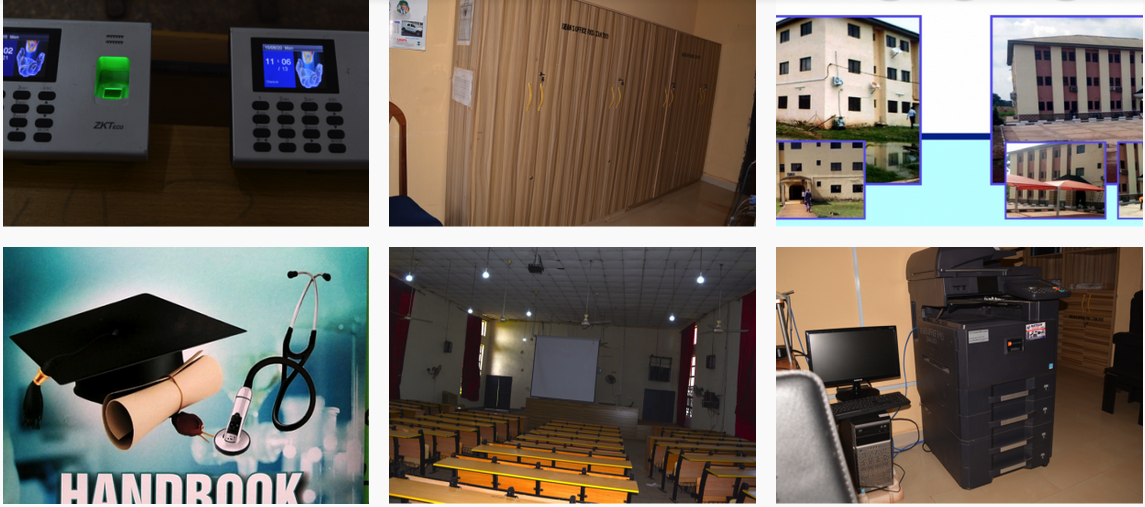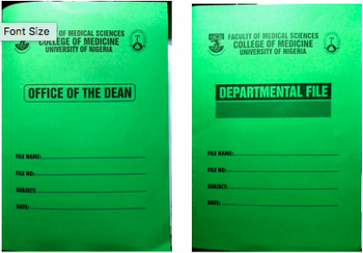BEGINNING
“We can't change anything until we get some fresh ideas, until we begin to see things differently” - James Hillman
I must begin by expressing profound gratitude to the Vice Chancellor, Professor Charles Arinzechukwu Igwe for giving me opportunity to serve as the Dean of Faculty of Medical Sciences for the 2018/2019 and 2019/2020 academic sessions.
Following my election and ratification, my team critically evaluated the current state of the Faculty with a view to addressing some of the challenges and help reposition the Faculty as a global brand. Areas that required intervention and in which we could effect lasting specific and tangible changes were identified through interactions with students and all cadre of staff; review of the available records; tour of facilities; a peek into the past; and review of the global benchmarks in medical education. The following were identified:
- Student’s Academics and Welfare
- Staff Training and Welfare
- Infrastructure Upgrade including Power supply
- Global Collaboration for Students’ learning and Exchange
- Examinations
- Curriculum Update
- Upgrade of Computerization of Records
- Faculty Handbook
THE CHANGES
Some of the changes we effected include:
- Student’s Academics and Welfare: The finding that poor attendance (at lectures, tutorials, and practical/clinical); poor social welfare; and dereliction of staff advising were at the root of poor performance by the students prompted us to provide lasting solutions.
- Restoration of Staff Advising: In the first place we restored academic staff advising and motivated the staff, providing accommodation for interaction with students and positive feedback mechanism.
- Biometric Attendance: Secondly, we introduced biometric (finger print) attendance coordinated by the Deans office, and with it attendance to academic programmes went up to more than 95%. To ease transportation cost to Ituku-Ozalla, we subsidized the cost of transportation on the Faculty bus.
- Counseling Unit: Thirdly, the counseling unit of the Faculty was restored and students with challenges were positively engaged with good outcome
- Social Welfare: The Faculty strengthened the welfare scheme with support from the Alumni who donated generously to the project. More than 60 students have benefitted from this loan scheme in the past 12 months
- Aid to Teaching: The Faculty provided Public address systems, Multimedia projectors, Laptops, and power generating sets to all the streams in the Faculty. This was extended to the First years students in the 2018 and 2019 session, with a plan to continue!
- PG programmes: These were strengthened and participation at the “centre” improved
- Staff Training and Welfare:
- Medical Education Workshops: The Faculty organized three workshops to Improve, Consolidate, and Review teaching & assessment skills in Medical Education for the Academic staff respectively in November 2018, May 2019, and February 2020. Medical Education experts drawn from outside and within UNN anchored each of the 2-day workshops. The lessons from these were golden.
- Workshop on Yellow Book: We organized the first Faculty workshop on Appreciation of the 5th Yellow Book in January 2020. The one-day workshop addressed Appraisal concerns and challenges of the academic staff
- First Faculty Elders Recognition: This programme designed to recognize and acclaim the contributions of the founding fathers of the Faculty and the retired members of staff also served to motivate the serving staff of the Faculty. It was a monumental nostalgic and “reunion Faculty Board”.
- Academic staff Award: Designed to motive the staff to give their best to uplift the Faculty, the criteria include student’s assessment (40%), departmental contributions (30%), Faculty contributions (20%), and academic output (10%).
- Meeting with Non-Teaching Staff: The Faculty introduced periodic meeting of the Dean and key officers of the Faculty with the non-teaching staff of the Faculty.
- Workshop for non-teaching Staff: The Faculty finalized arrangement and scheduled a one-day workshop in June 2020 on how to contribute in positioning the Faculty and the University as a global brand. Key resource persons invited were the former Registrars of UNN and University of Ibadan. The workshop was halted by the COVID-19 pandemic induced lockdown.
- Infrastructure and Power Supply Upgrade
a. UNNCOMA Lecture Hall at Ituku-Ozalla: This main lecture hall of the Faculty received significant upgrade in 2018 -2020. The upgrade include
- Installation of Fixed Public Address system
- Installation of Fixed wall fans to augment the spaced out ceiling fans
- Installation of retractable 10 x 10 feet projector screen
- Installation of Fixed multimedia projector
- Construction of fixed podium table
- Upgrade of the Solar Power supply
b. Deans office Operations
- Paperless Operations: Computerization of the operations
- Replacement of the filing cabinets and shelves
- Installation of wireless printers, scanners, etc
- Institution and maintenance of 48-hour benchmark for all operations
- Renovation of the Conference room.
c. Landscaping of the Faculty Building
The Faculty building was surrounded by insalubrious environment. We produced a design, got funding for direct labour from the Alumni and friends of the Faculty, and constructed a good landscaping and parking shades for the building. Please try and visit the Faculty of Medical Sciences at Ituku-Ozalla and see the transformation!
d. Pathology Lecture Hall at Old UNTH: The lecture hall was upgraded with installation of more fixed seats (to accommodate the increased number of clinical students), more fans were also installed with rewiring of the hall, repair of leaking roofing, replacement of damaged windows, and installation of security doors.
e. Toilets and Water Supply: All the 14 toilets and the 14 washing basins in the Faculty building and the Lecture hall at Ituku-Ozalla were refurbished and 24/7 water supply ensured since January 2019 (may seem as if we anticipated the NCDC requirements for COVID-19 control). We deepened and renovated the existing well, provided more storage, and installed more pumping machines. We have also concluded arrangements to dig wells at the NUGA hostel, and provide storage and pumping machines there as well.
f. Ramp for the NUGA Hostel at Ituku-Ozalla: This was prompted by the need of one of our final year students who is paraplegic and has been on wheelchair since childhood. It will serve other students as well.
- Global Collaboration for Students’ learning and Exchange:We entered into partnership with Global Educational Exchange in Medicine and health professionals (GEMx). Through GEMx, the Educational Commission for Foreign Medical Graduates (ECFMG®) partners with individual medical schools, health organizations, and training institutions around the world. Through its Global Network, GEMx connects educational institutions in medicine and the health professions around the world to offer students enhanced opportunities for affordable and accessible educational exchange. So far there are only 2 other medical schools in West Africa in this partnership.
- Faculty Blog: We created an active blog for the Faculty (facultyofmedicalsciencesunn.org) with a full link to the faculty domain at UNN website. The blog contains dynamic information on the activities of the Faculty including scientific presentations and publications, video clips of teaching materials and surgical procedures, our students and alumni activities, Faculty events to mention but a few. The blog serves to improve visibility of the Faculty and the University
- Examinations: To improve the outcome of summative examinations, we introduced more formative (continuous assessment) examinations. To facilitate these examinations and timely release of results, we recently procured a new Scantron with security-embedded OMR sheets. As a result of the improved attendance to lectures and practicals by students, and enhanced counseling, and introduction of more formative assessments, the pass rate for each of the professional examinations has significantly increased to more than 95%.
- Review of Undergraduate Curriculum: The curriculum for undergraduate medical education currently in use was last updated more than 12 years ago. This implies that we are far behind in current trends. We commenced review of the curriculum to bring it up to the current global benchmark. The Committee has worked assiduously and is expected to submit the finished draft later in the year. This will be passed through the College Academic Board to the Senate.
- Computerization of Academic Records: The academic records including details of the postings of the graduates of the Faculty from its inception till date can now be accessed by authorized persons with just their name or registration number. This was made possible by the upgrade of the facility introduced four-years ago.
- Faculty Handbook: Faculty of Medical Sciences Handbook is long overdue. We set up Committee to produce the maiden handbook that will contain suitable information on the policies, attributes, rules and procedures of the Faculty. This will undeniably help to reposition our Faculty as a global brand. The Handbook was unveiled to the university community in the first week of July.
- Audit of the Dean’s Activities. We initiated an audit of our administration. The Academic staff independently audited the activities of the Dean and his team after one year in office. The survey was administered and analyzed by an external body. Feedback from the audit helped us to improve on our services.
- Faculty Customized Office Files: The Faculty produced the first of its kind customized files for use in the Deans office and the various departments of the Faculty.
2018 - 2020 WORKS


HOW WERE THESE POSSIBLE
First we discovered deficiencies in the training programme, service delivery, facilities, infrastructure, and welfare. Secondly, we produced workable blueprints including quotations, drawings, plans, time-lines etc. Thirdly, we went sourcing for sponsors to implement the blueprint from the Alumni and friends of the Faculty. Finally we used the donations judiciously and reported back to the donors.
ACKNOWLEDGEMENT
I express my gratitude to God Almighty for the grace he gave me to serve the Faculty and the University. To the Vice Chancellor, I am indeed grateful for your accent and support. My gratitude is also to the Associate Deans (Clinical: Dr. Ikenna Nnabugwu; and PreClinical: Prof. Euzebus Ezugwu), Heads of Departments, Previous Deans, Chairperson of Faculty Committees, Dean’s office staff, and Academic and Non-Teaching staff for their support during this tenure.
PROFESSOR SEBASTIAN O EKENZE
DEAN, FMS (2018-2020)
